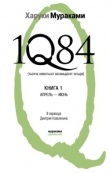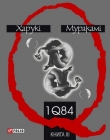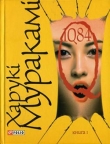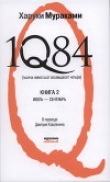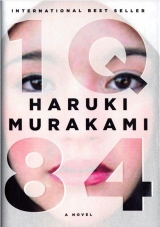
Текст книги "1q84"
Автор книги: Haruki Murakami
Жанр:
Современная проза
сообщить о нарушении
Текущая страница: 70 (всего у книги 81 страниц)
1
Eriko Fukada has left.
2
Tengo Kawana hasn’t come back yet.
No one was in Tengo Kawana’s third-floor apartment. The curtains were drawn, and silence enveloped the deserted space. Other than the compressor of the fridge switching on from time to time, nothing disturbed the silence. Ushikawa let his imagination wander over the scene. Imagining a deserted room was a lot like imagining the world after death. Suddenly he remembered the NHK fee collector and his obsessive knocking. He had kept constant watch but never saw any trace that this mysterious man had left the building. Could he be a resident here? Or was it someone who lived here who liked to pretend to be a fee collector to harass the other residents? If the latter, what would possibly be the point? This was a very morbid theory, but what else could explain such a strange situation? Ushikawa had no idea.
Tengo Kawana showed up at the entrance to the apartment building just before four that afternoon. He wore an old windbreaker with the collar turned up, a navy-blue baseball cap, and a travel bag slung over his shoulder. He didn’t pause at the entrance, didn’t glance around, and went straight inside. Ushikawa’s mind was still a bit foggy, but he couldn’t miss that large figure.
“Welcome back, Mr. Kawana,” Ushikawa muttered aloud, and snapped three photos with the motor-drive camera. “How’s your father doing? You must be exhausted. Please rest up. Nice to come home, isn’t it, even to a miserable place like this. By the way, Eriko Fukada moved out, with all her belongings, while you were gone.”
But his voice didn’t reach Tengo. He was just muttering to himself. Ushikawa glanced at his watch and wrote a memo in his notebook. 3:56 p.m., Tengo Kawana back home from trip.
At the same moment that Tengo appeared at the entrance, a door somewhere opened wide and Ushikawa felt reality returning. Like air rushing into a vacuum, his nerves were instantly sharp, his body filled with a fresh vitality. He was again a useful part of the outside world. There was a satisfying click as things fell into place. His circulation sped up, and just the right amount of adrenaline surged through his body. Good, this is how it should be. This is the way I’m supposed to be, the way the world is supposed to be.
It was after seven p.m. when Tengo appeared at the entrance again. The wind had picked up after sunset, and the temperature had dropped. Tengo wore a sweater under a windbreaker with faded jeans. He stepped outside and stood there, looking around, but he didn’t see anything. He glanced at where Ushikawa was hiding, but didn’t pick out the observer. He’s different from Eriko Fukada, Ushikawa thought. She’s special. She can see what others can’t. But you, Tengo—for better or worse you’re an ordinary person. You can’t see me sitting here.
Seeing that nothing had changed outside, Tengo zipped his jacket up to his neck, stuck his hands in his pockets, and walked out onto the main road. Ushikawa hurriedly put on his knit cap, wrapped the muffler around his neck, slipped on his shoes, and went out to follow Tengo.
Tengo strolled slowly down the street and turned around to look behind him a few times, but Ushikawa was careful and Tengo didn’t see him. Tengo seemed to have something on his mind. Perhaps he was thinking about Fuka-Eri being gone. He was apparently heading toward the station. Maybe he was going to take a train somewhere? That would make tailing him difficult. The station was well lit, and on a Saturday night there wouldn’t be many passengers. Ushikawa would be extremely conspicuous. In that case, it would be smarter to give up.
But Tengo wasn’t heading toward the station. He walked for a while and then turned down a nearly deserted street and came to a halt in front of a bar named Mugiatama. It was a bar for young people, by the look of it. Tengo glanced at his watch to check the time, stood there pondering for a few seconds, then went inside. Mugiatama, Ushikawa thought. He shook his head. What a stupid name for a bar.
Ushikawa hid in the shadow of a telephone pole and checked out his surroundings. Tengo was probably going to have a couple of drinks there and a bite to eat, so it would take at least a half hour. Worst-case scenario, Ushikawa would have to stay put for an hour. He looked around for a good place nearby to kill time while he watched the people going in and out of the bar. Unfortunately, though, there was just a milk distributor, a small Tenrikyo meeting hall, and a rice wholesaler, and all of them were closed. Man, I never get a break, he thought. The strong northwest wind blew the clouds swiftly by. The warmth of the daytime seemed like a dream now. Ushikawa wasn’t relishing the idea of standing in the freezing cold for thirty minutes to an hour, doing nothing.
Maybe I should give it up. Tengo’s just having a meal here. There is no need to go to all the trouble of shadowing him. Ushikawa considered popping in to some place himself, having a hot meal, then going home. Tengo would come back home before long. That was a very attractive choice. Ushikawa pictured himself in a cozy little restaurant, enjoying a piping hot bowl of oyakodon—rice topped with chicken and eggs. These last few days he hadn’t eaten anything worth mentioning. Some hot sake would hit the spot too. In this cold, one step outside and you’ll sober up quick.
But another scenario came to him. Tengo might be meeting somebody at Mugiatama. When Tengo left his apartment, he went straight there, and he checked his watch just before he went in. Someone might be waiting for him inside, or might be on his way. If that was the case, Ushikawa had to know who this person was. His ears might freeze off, but he had to stand watch and see who went into the bar. He resigned himself to this, wiping the picture of oyakodon and hot sake from his mind.
The person he’s meeting might be Fuka-Eri. Or Aomame. Ushikawa pulled himself together. After all, perseverance is my strong point. If there was a glimmer of hope, he clung to it desperately. The rain could pelt him, the wind could blow, he could be burned by the sun and beaten with a stick, but he would never let go. Once you let go, you never know when you will get ahold of it again. He knew full well there were more painful things than this in the world—a thought that helped him endure his own suffering.
He leaned against the wall, in the shadows of the telephone pole and a sign advertising the Japanese Communist Party, and kept a sharp watch over the front door of Mugiatama. He wrapped the green muffler up to his nose and stuck his hands inside the pockets of his pea coat. Other than occasionally extracting a tissue from his pocket to blow his nose, he didn’t move an inch. Announcements over the PA system at Koenji Station would filter over, on the wind, from time to time. Some pedestrians looked nervous when they saw Ushikawa huddled in the shadows, and hurried past. Since it was dark, though, they couldn’t make out his features. His stocky frame loomed in the shadows like some ominous ornament and sent people scurrying away in fright.
What could Tengo be drinking and eating in there? The more he thought about it, the hungrier, and colder, he got. But he couldn’t help imagining it. Anything’s fine—doesn’t have to be hot sake or oyakodon. I just want to go someplace warm and have a regular meal. But if I can stand being out here in the cold, I can take anything.
Ushikawa had no choice. There was no other path for him to take than this one, freezing in the cold wind until Tengo finished his meal. Ushikawa thought about his home in Chuorinkan, and the dining table there. There must have been hot meals on that table every day, but he couldn’t recall them. What in the world did I eat back then? It was like something out of antiquity. Long, long ago, a fifteen-minute walk from Chuorinkan Station on the Odakyu Line, there had been a newly built house and a warm, inviting dinner table. Two little girls played piano, and a small pedigreed puppy scampered about the tiny garden and lawn.
Tengo came out of the bar thirty-five minutes later. Not bad. It could have been a lot worse, Ushikawa reassured himself. The thirty-five minutes had been terrible, but it was certainly better than an awful hour and a half. His body was chilled, but at least his ears hadn’t frozen. While Tengo was in the bar, there was no one going in or out of Mugiatama who caught Ushikawa’s attention. Just one couple went inside, and no one came out. Tengo must have just had a few drinks and a light meal. Keeping the same distance as before, Ushikawa followed behind him. Tengo walked down the same street, most likely headed back to his apartment.
But Tengo turned off this street and headed down a road that Ushikawa had never been on before. It looked like Tengo was not on his way home after all. Ushikawa was convinced that he was still lost in thought, maybe even more so than before. He didn’t glance back this time. Ushikawa kept track of the scenery passing by, checked the street signs, trying to memorize the route so he could retrace it later on. Ushikawa wasn’t familiar with this area, but from the increasing buzz of traffic, like the rushing of a river, he surmised they must be getting closer to the Ring Road. Before long Tengo picked up the pace. Getting closer to his destination, perhaps.
Not bad. So this guy is heading somewhere. It was worth tailing him after all.
Tengo quickly cut through a residential street. It was a Saturday night, with a cold wind blowing, so everyone else was inside, in front of the TV, enjoying a hot drink. The street was practically deserted. Ushikawa followed behind Tengo, making sure to keep enough distance between them. Tengo was an easy type of person to shadow. He was tall and big-boned, and wouldn’t get lost in a crowd. He just forged on ahead and didn’t get sidetracked. He was always looking slightly down, thinking. He was essentially a straightforward, honest man, not the type to hide anything. Totally different from me, Ushikawa thought.
Ushikawa’s wife had also liked to hide things. No—it wasn’t that she liked to hide things, she couldn’t help it. Ask her what time it was, and she probably wouldn’t tell you the correct time. Ushikawa wasn’t like this. He only hid things when it was necessary, only when it pertained to work. If someone asked him the time and there was no reason for him to be dishonest, he would tell them, and be nice about it. Not like his wife. She even lied about her age, shaving four years off. When they submitted the documents for their marriage license he found out how old she really was, but pretended not to notice. Ushikawa couldn’t fathom why she had to lie about something that was going to come out anyway. Who cared if his wife happened to be seven years older?
As they got even farther from the station, there were fewer people on the street. Eventually Tengo turned into a little park, a nothing little playground in one corner of a residential district. The park was deserted. Of course it is, Ushikawa thought. Who feels like spending time in a playground on a cold, windy December night? Tengo passed under the cold light of a mercury-vapor lamp and headed straight toward the slide. He stepped onto it and climbed to the top.
Ushikawa hid behind a phone booth and kept an eye on Tengo. A slide? Ushikawa frowned. Why does a grown man have to climb to the top of a slide on a freezing cold night like this? This wasn’t near Tengo’s apartment. There must be some reason he would go out of his way to come here. It wasn’t exactly the most appealing playground. It was cramped and shabby. In addition to the slide there were two swings, a small jungle gym, and a sandbox. A single mercury-vapor lamp that looked like it had illuminated the end of the world more than a few times, a single crude, leafless zelkova tree. A locked-up public toilet was the perfect canvas for graffiti. There was not a thing in this park to warm people’s hearts, or to stimulate the imagination. Perhaps on a bracing May afternoon there might be something. But on a windy December night? Forget it.
Was Tengo meeting up with somebody here? Waiting for somebody to show? Ushikawa didn’t think so. Tengo didn’t give any signs to indicate that he was looking for someone. When he entered the park, he ignored all the other equipment. The only thing on his mind seemed to be the slide. Tengo came here to climb up that slide.
Maybe he had always liked to sit on top of slides when he needed to think. Maybe the top of a slide in a park at night was the perfect place to think about the plot of the novel he was writing, or mathematical formulas. Maybe the darker it was, the colder the wind blew, the shabbier the park, the better he could think. What or how novelists (or mathematicians) thought was way beyond anything Ushikawa could imagine. His practical mind told him that he had to stay put, patiently keeping an eye on Tengo. His watch showed exactly eight p.m.
Tengo sat down on top of the slide, as if folding his large frame. He looked up at the sky. He moved his head back and forth, then settled on a single spot, and gazed upward, his head still.
Ushikawa recalled a sentimental old pop song by Kyu Sakamoto. It began: Look up at the night sky / see the little stars. He didn’t know how the rest of it went and he really didn’t care to know. Sentiment and a sense of justice were Ushikawa’s two weakest areas. Up on top of the slide, was Tengo feeling sentimental as he gazed at the stars?
Ushikawa tried looking up at the sky himself, but he couldn’t see any stars. Koenji, Suginami Ward, Tokyo, was not the best place to observe the night sky. Neon signs and lights along the street dyed the whole sky a weird color. Some people, if they squinted hard, might be able to make out a few stars, but that would require extraordinary vision and concentration. On top of that, the clouds tonight were blowing hard across the sky. Still, Tengo sat motionless on top of the slide, his eyes on a fixed point in the sky.
What a pain in the butt this guy is, Ushikawa decided. What possible reason could there be to sit on a slide, gaze up at the sky, and ponder things on a windy winter night like this? Not that he had any right to criticize Tengo. Ushikawa had taken it upon himself, after all, to secretly observe Tengo, and shadow him. Tengo was a free citizen and had every right to look at what he wanted, where he wanted, the whole year round.
Still, it’s damn cold. He had needed to pee for some time, but had held it in. The public toilet was locked, though, and even in a deserted place like this he couldn’t very well just pee next to a phone booth. Come on, he thought, stamping his feet, can’t you just get up and leave already? You might be lost in thought, overtaken by sentiment, deep into your astronomical observations, but Tengo—you gotta be freezing too. Time to go back to your place and warm up, don’t you think? Neither of us has anyone waiting for us, but it’s still a hell of a lot better than hanging out here and freezing our rear ends off.
Tengo didn’t seem about to get up, though. He finally stopped gazing at the sky, and he turned his attention to the apartment building across the way. It was a new condo, six stories tall, with lights on in about half the windows. Tengo stared at the building. Ushikawa did the same but found nothing that caught his attention. It was just an ordinary condo. It was not an exclusive building, but fairly high-class nonetheless. High-quality design, expensive tile exterior. The entrance was beautiful and well lit. It was a different animal entirely from the cheap, slated-to-be-torn-down place that Tengo called home.
As he gazed up at the condo, was Tengo wishing he could live in a place like that? Ushikawa didn’t think so. As far as Ushikawa knew, Tengo wasn’t the type to care about where he lived. Just like he didn’t care much about clothes. Most likely he was happy with his shabby apartment. A roof over your head and a place to keep out of the cold—that was enough for him. Whatever was running through his head up there on the slide must be something else.
After Tengo had looked at all the windows in the condo, he turned his gaze once more to the sky. Ushikawa followed suit. From where he was hidden, the branches of the zelkova tree, the electric lines, and the other buildings got in the way. He could only see half the sky. What particular point in the sky Tengo was looking at wasn’t at all clear. Countless clouds ceaselessly scudded across the sky like some overwhelming army bearing down on them.
Eventually, Tengo stood up and silently climbed down from the slide, like a pilot having just landed after a rough solo flight at night. He cut across the playground and left. Ushikawa hesitated, then decided not to follow him. Most likely Tengo was on his way back to his place. Plus Ushikawa had to pee like crazy. After he saw Tengo disappear, he went into the playground, hustled behind the public toilet, and in the darkness where no one could see him, he peed into a bush. His bladder was ready to burst.
He finally finished peeing—the operation taking as long as it would take a long freight train to cross a bridge—zipped up his pants, shut his eyes, and gave a deep sigh of relief. His watch showed 8:17. Tengo had been on top of the slide for about fifteen minutes. Ushikawa checked again that Tengo wasn’t around and headed toward the slide. He clambered up the ladder with his short, bandy legs, sat down on the very top of the freezing slide, and looked up. What could he have been staring at so intently?
Ushikawa had pretty good eyesight. Astigmatism made his eyes a bit out of balance, but generally he could get by every day without glasses. Still, no matter how hard he looked, he couldn’t make out a single star. What caught his attention instead was the large moon in the sky, about two-thirds full. Its dark, bruised exterior was clearly exposed between the clouds. Your typical winter moon. Cold, pale, full of ancient mysteries and inklings. Unblinking like the eyes of the dead, it hung there, silent, in the sky.
Ushikawa gulped. For a while, he forgot to breathe. Through a break in the clouds, there was another moon, a little way apart from the first one. This was much smaller than the original moon, slightly warped in shape, and green, like it had moss growing on it. But it was undoubtedly a moon. No star was that big. And it couldn’t be a satellite. Yet there it was, pasted onto the night sky.
Ushikawa shut his eyes, then a few seconds later opened them again. This must be an illusion. That kind of thing can’t be there. But no matter how many times he opened and closed his eyes, the little moon was still in the sky. Passing clouds hid it occasionally, but once they passed by, there it was, in the same exact spot.
This is what Tengo was looking at. Tengo Kawana had come to this playground to see this scene, or perhaps to check that it still existed. He has known for some time that there are two moons. No doubt about it. He didn’t look at all surprised to see it. On top of the slide, Ushikawa sighed deeply. What kind of crazy world is this? he asked himself. What sort of world have I gotten myself into? But no answer came. Swept by countless clouds racing by, the two moons—one big, one small—hung in the sky like a riddle.
There’s one thing I can say for sure, he decided. This isn’t the world I came from. The earth I know has only one moon. That is an undeniable fact. And now it has increased to two.
Ushikawa began to have a sense of déjà vu. I’ve seen the same thing before somewhere, he thought. He focused, desperately searching his memory. He frowned, grit his teeth, dredging the dark sea bottom of his mind. And it finally hit him. Air Chrysalis.
He looked around, but all he saw was the same world as always. White lace curtains were drawn in windows in the condo across the street, peaceful lights on behind them. Nothing out of the ordinary. Only the number of moons was different.
He carefully climbed down from the slide, and hurriedly left the playground as if running from the eyes of the moons. Am I going nuts? he wondered. No, that can’t be it. I’m not going crazy. My mind is like a brand-new steel nail—hard, sober, straight. Hammered at just the right angle, into the core of reality. There’s nothing wrong with me. I’m completely sane.
It’s the world around me that’s gone crazy.
And I have to find out why.


